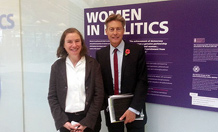
Physicist Dr Annette Plaut spent a week in Westminster with Exeter MP Ben Bradshaw as part of a science pairing scheme
Exeter scientist goes from lab bench to backbench
Dr Annette Plaut from the University of Exeter is swapping a lab coat for legislation as she visits Exeter MP Ben Bradshaw at the House of Commons.
The visit is for a ‘Week in Westminster’, which commenced on Monday 29 October as part of a unique ‘pairing’ scheme run by the Royal Society – the UK’s national academy of science.
During her visit, Dr Plaut is shadowing the MP to learn about his work, as well as attending a House of Commons Science and Technology Committee meeting and Prime Minister’s Question Time, and meeting Professor Sir John Beddington, Government Chief Scientific Advisor. The visit will provide Dr Plaut with a behind-the-scenes insight into how science policy is formed, as well as an understanding of the working life of an MP.
Dr Annette Plaut is a Senior Lecturer in Physics at the University of Exeter. Her research focuses on graphene – the thinnest known material with unique mechanical, electrical and optical properties. Scientists and engineers at the University of Exeter and around the world are working to develop graphene-based practical applications, from all-carbon-based nano-electronics that can rival or even replace silicon technology, to medicine and healthcare. Dr Plaut’s research into the different ways in which the atoms in graphene vibrate will help with these innovations.
Dr Annette Plaut said: "I have had a lifelong interest in politics, and I am keen to share the scientific approach with policy makers. I believe an evidence-based approach is as important for politics as it is for science.
"I am very excited to have this opportunity to spend time in Westminster and am also really looking forward to welcoming Ben Bradshaw to our laboratories here at the University.
Ben Bradshaw MP said: "I'm a strong believer that policy should be based on good evidence and have always been interested in the relationship between science and politics. So I'm looking forward to taking part in this pairing scheme with Annette.
The Royal Society’s MP-Scientist pairing scheme aims to build bridges between parliamentarians and some of the best scientists in the UK. It is an opportunity for MPs to become better informed about science issues and for scientists to understand how they can influence science policy. Over 200 pairs of scientists and MPs have taken part in the scheme since it was launched in 2001.
Sir Paul Nurse, President of the Royal Society said: “We live in a world facing increasing challenges that can only be addressed with a clear understanding of science. From climate change to influenza outbreaks, GM food to nuclear power, our MPs have to make decisions about complex issues that will affect the lives of all those in the UK and, in many cases, more widely throughout the world. This means that MPs and scientists have a responsibility to engage with each other to get the best possible scientific advice into public policy making.
“We set up the Royal Society’s MP Scientist pairing scheme in 2001 to provide the opportunity for MPs and scientists to build long-term relationships with each other and have now organised over two hundred pairings.
“I know many parliamentarians and scientists who have gained from the scheme, and the shaping of public policy can only improve over time as these relationships continue to grow.
Date: 1 November 2012
